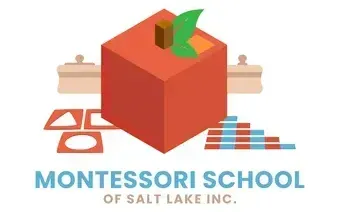Explore Our Montessori Programs for Holistic Child Development.

Tailored Education for Children in Salt Lake City
- "With the growing interest in alternative education in Salt Lake City, Montessori offers a proven, child-centered approach that helps students thrive academically and socially."
- "Many families in Salt Lake City seek a structured yet nurturing learning environment that goes beyond traditional schooling, making Montessori an ideal choice."

"I have studied the child, I have taken what the child has given me, and expressed it, and that is what is called the Montessori Method."
- Maria M.
Maria Montessori died in Noodwijk, Holland, in 1952, but her work continues.
Montessori School Program Activities
Our Montessori Sessions are conducted in a prepared environment and consist of the following activities:
✓ Sensorial activities enhance and enlarge the child's sense of world perception.
✓ Practical life activities – child develops personal and social skills used in daily living.
✓ Reading and writing – the child learns correct letter enunciation and formation.
✓ Mathematics – introduction to counting and arithmetic.
✓ Geography – the child learns about the world's regions through geo-molds and puzzles.
✓ Science – exciting and fun activities that are "hands-on" and "teacher and child friendly."
Need more information? Call us at 801-467-7412 or send us an email to info@montessorisaltlake.com to speak with one of our friendly office staff members.
What is Montessori?
Over 100 years ago, Dr. Maria Montessori developed her education theory after observing young children and paying close attention to their learning.
Italian physician and educator Maria Montessori developed the Montessori method in the early 20th century. Based on the idea that children are naturally curious and allow exploring and learn in their way, with guidance from trained teachers.
The Montessori method has been studied and evaluated in various research studies. A meta-analysis of studies published in the journal Science Direct found that Montessori education positively affected cognitive and academic outcomes and social and emotional development (Lillard & Else-Quest, 2006).
Many educators and researchers have recognized the Montessori method as a successful educational approach, and it continues in schools worldwide.
Her pioneering work created a blueprint for educating children, from the learning disabled to the gifted, and helping children become self-motivated, independent lifelong learners.
Did you know?
Who was Maria Montessori?
Maria Montessori (1870-1952) was an Italian physician, educator, and innovator who developed the Montessori method of education. She was the first woman to graduate from the University of Rome La Sapienza medical school. Montessori went on to work as a physician and researcher in psychiatry and education.
In 1907, she opened the first Montessori school, Casa dei Bambini (Children's House), in a low-income area of Rome. The school based its philosophy on Montessori's method, emphasizing child-centered learning, hands-on exploration, and self-directed activity.
Montessori believed that children naturally desire to learn and should be allowed to develop at their own pace in an environment that encourages independence, creativity, and exploration. Her educational approach emphasized the importance of providing children with opportunities to engage in purposeful activity and work with materials specifically designed to stimulate their senses and promote their cognitive and social development. Schools worldwide have since adopted the Montessori method, widely recognized as a highly effective approach to early childhood education.
A New Way of Learning
Maria Montessori developed her approach to education because she believed that traditional teaching methods did not adequately address the needs of individual children. She thought that children naturally desire to learn and should be allowed to develop at their own pace in an environment that encourages independence, creativity, and exploration.
Her work also influenced Montessori's approach to education as a physician and researcher in psychiatry and education. She observed that children who were given opportunities to engage in purposeful activity and who were allowed to explore their environment at their own pace showed more significant levels of satisfaction and engagement in their learning.
Montessori believed that education should focus on the development of the whole child, not just their academic abilities. She felt that children should be encouraged to develop their social, emotional, and physical skills and cognitive abilities.
Overall, Montessori developed her approach to education as a response to what she saw as the limitations of traditional education methods and to provide children with an environment that supports their natural curiosity and desire to learn.
Why Montessori?
- Emphasis on cognitive and social development.
- The teacher has a hidden role in the class.
- Environment and method encourage self-discipline.
- Mixed-age grouping encourages children to teach and help each other.
- Children choose their work and discover concepts from self-teaching material.
- The child works if he feels the need on a selected project.
- Child spots their errors from the feedback of material which reinforces learning by feeling.
- Multi-sensory materials for physical development
- Organized program for learning care of oneself and the environment.
- The child can work where he chooses, move around, and talk freely.
- Emphasis on social development.
- The teacher is the center of the class.
- The teacher acts as the primary enforcer of discipline.
- Same age grouping and most of the teaching is done by the teacher.
- Curriculum structured for the child, and it is guided to concepts by the teacher.
- Generally, the child is allotted specific time to work on a chosen project.
- The teacher usually points out errors. Reinforcement of learning is by repetition of work and rewards of success.
- Fewer materials for sensory exploration.
- Less emphasis on self-care instructions.
- The child is usually assigned a chair.
Why Montessori? A Compelling Alternative to Traditional Education
Where Children Learn How to Learn
A Personalized Approach to Learning
Parents seeking an alternative to public schools, charter schools, or non-Montessori private schools often find that Montessori offers a unique educational experience that fosters lifelong learning, independence, and creativity. Unlike traditional education models that emphasize standardized instruction, Montessori tailors learning to each child's individual pace, interests, and abilities.
Key Differences Between Montessori and Traditional Education
1. The Role of the Teacher
- Montessori: The teacher acts as a guide and observer, fostering curiosity and self-motivation rather than directing every step of the learning process.
- Traditional Schools: Teachers are the primary source of instruction, leading lessons and determining what students learn and when.
2. Learning Process & Independence
- Montessori: Children choose their work based on interest, fostering intrinsic motivation and a love for learning.
- Traditional Schools: Curriculum is predetermined and all students progress at the same pace, regardless of readiness.
- Montessori: Students learn at their own pace, with self-teaching materials that encourage critical thinking and hands-on problem-solving.
- Traditional Schools: Standardized testing and set timelines dictate how and when concepts are introduced.
3. Hands-On vs. Passive Learning
- Montessori: Uses multi-sensory materials to help children grasp complex concepts in math, language, and science.
- Traditional Schools: Relies on textbooks, lectures, and memorization, often limiting hands-on discovery.
- Montessori: Children spot and correct their own errors using materials designed for self-correction, reinforcing confidence and independence.
- Traditional Schools: The teacher identifies mistakes, and students often rely on external validation rather than internal problem-solving.
4. Classroom Environment & Structure
- Montessori: Mixed-age classrooms encourage mentorship, leadership, and a collaborative spirit among students.
- Traditional Schools: Students are grouped strictly by grade level, limiting peer-to-peer learning opportunities.
- Montessori: Children have the freedom to move, choose their workspace, and work on projects that align with their interests.
- Traditional Schools: Students follow a rigid schedule, often assigned desks with limited movement and flexibility.
5. Discipline, Confidence & Personal Growth
- Montessori: Focuses on self-discipline and internal motivation, allowing children to take ownership of their education and behavior.
- Traditional Schools: Discipline is typically teacher-enforced, with external rewards and consequences shaping behavior.
- Montessori: Encourages practical life skills, teaching children self-care, responsibility, and respect for their environment.
- Traditional Schools: Emphasizes academic benchmarks, with less focus on life skills and holistic development.
Why Choose Montessori Over Public, Charter, or Traditional Private Schools?
- Personalized Learning – Montessori allows each child to reach their full potential without the constraints of standardized pacing and testing.
- Smaller Class Sizes – More individualized attention compared to many public and charter school settings.
- Focus on Critical Thinking – Instead of rote memorization, Montessori fosters analytical skills, problem-solving, and creativity.
- Whole-Child Development – In addition to academics, Montessori builds confidence, independence, and social-emotional skills that prepare children for life.
- Lifelong Love of Learning – Montessori instills curiosity and a passion for learning, rather than focusing solely on grades and test scores.
Experience the Montessori Difference
Montessori education is designed to empower children, fostering curiosity, independence, and a love for learning. By allowing students to take charge of their education in a structured and supportive environment, we help them develop skills that extend far beyond the classroom.
Book a Tour Today to see Montessori in action and discover why it’s the best choice for your child’s future.
Call us at 801-467-7412 to schedule a tour of the magic learning kingdom of the Montessori School of Salt Lake City.
